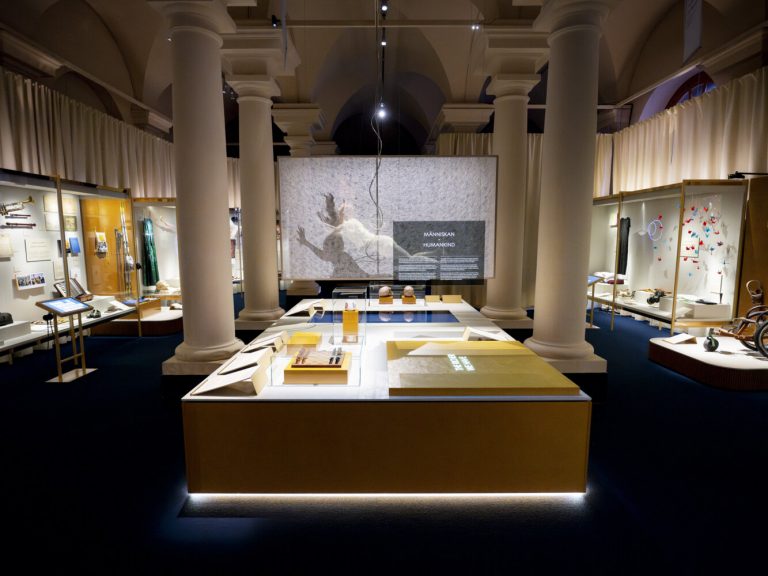What significance can an artefact have, and what kind of story does it tell about the person who owned it? For the first time, the Nobel Prize Museum’s new exhibition “These things changed the world” displays a large selection from its collection of artefacts donated by Nobel Prize laureates. The exhibition features more than 250 artefacts and opens today, 8 March.
In this exhibition, visitors can gain insights into remarkable discoveries and achievements based on the personal artefacts that Nobel Prize laureates have donated to the museum over the years.
“Every year, new artefacts are added to our collection. It feels great that we can now display more than 250 artefacts at the same time,” says Erika Lanner, Director of the Nobel Prize Museum. “Hidden in everyday objects such as a suitcase, a pair of nail scissors or a jar of peanut butter are stories of great discoveries, courageous peace efforts and innovative literature. These items also provide new and unexpected knowledge about the people behind the Nobel Prizes.”
The exhibition includes a scarf from peace prize laureate Malala Yousafzai that she wore when speaking before the United Nations at the age of 16. Literature laureate Nelly Sachs’ suitcase is also on display. It contained what she took with her when she fled to Sweden on one of the last civilian flights from Berlin in May 1940, in the midst of the World War. Nelly Sachs was Jewish, and her poetry and dramatic works largely deal with the fate of the Jewish people. In the exhibition you can also read several letters written by Albert Einstein, laureate in physics, including one in which he gives instructions to his sons on what they should do with his prize money.
Economic sciences laureate Amartya Sen’s research focuses on the conditions of the world’s poorest and how they can be improved. During a study to explain differences between newborn girls and boys, he employed an assistant to weigh the babies. However, the babies did not want to be weighed and bit the assistant. In the end, Sen himself cycled around the West Bengal countryside and weighed the children. His bicycle is now part of the exhibition, as well as one of the hats that literature laureate Wole Soyinka used to hide his characteristic bushy hair to avoid being recognised.
In addition to individual artefacts, there are three in-depth displays in the exhibition that focus on some of humanity’s greatest questions – the cosmos, human nature and the ingredients of life. What does everything consist of, and what do we know about black holes? What does the riddle of ageing look like? What do we need to know about human consciousness, human rights, and artificial life to shape our future?
About the Nobel Prize Museum’s collection
The Nobel Prize Museum’s collection of artefacts reflects the various subject areas of the Nobel Prize and the activities, interests and personalities of the laureates. The origins of these artefacts vary. Most of them were donated to the museum by the laureates themselves. Others have arrived at the museum by other routes. It does not seem strange that instruments and equipment are a part of scientific research. Or that pens and manuscripts tell us about authors’ works. But what do suitcases, caps and musical instruments say about the lives and achievements of Nobel Prize laureates? How can a pair of nail scissors, a bicycle or a jar of peanut butter tell us anything about creativity and insights? You can find out more about this in the exhibition “These things changed the world”.
The exhibition is produced by the Nobel Prize Museum and the graphic designer is Birger Lipinski.
Press images
https://www.nobelprize.org/press-images-these-things-changed-the-world
For more information, please contact
The Nobel Prize Museum
The Nobel Prize shows that ideas can change the world. The courage, creativity and perseverance of the Nobel Prize laureates inspire us and give us hope for the future. Films, in-depth tours, and artefacts tell the stories of the laureates and their contributions “for the greatest benefit to humankind”. Based on the Nobel Prize’s unique combination of fields – natural sciences, literature and peace – we examine the greatest challenges of our time and show how we can respond to them through science, humanism and collaboration. With our exhibitions, school programmes, lectures and conversations, we at the Nobel Prize Museum strive to engage the public in making a better world. Today we are located on Stortorget, the main square in Gamla Stan, Stockholm’s Old Town district. We are planning to create a new home for our public outreach activities at Slussen in central Stockholm.
Disclaimer: The Nobel Prize Museum is not directly or indirectly involved in the process of nominating or selecting Nobel Prize laureates. These procedures are strictly confidential and regulated by the Nobel Prize awarding institutions.
© Nobel Prize Museum 2024. Nobelpriset®, Nobel Prize® and the Nobel Prize medal are registered trademarks of the Nobel Foundation.
